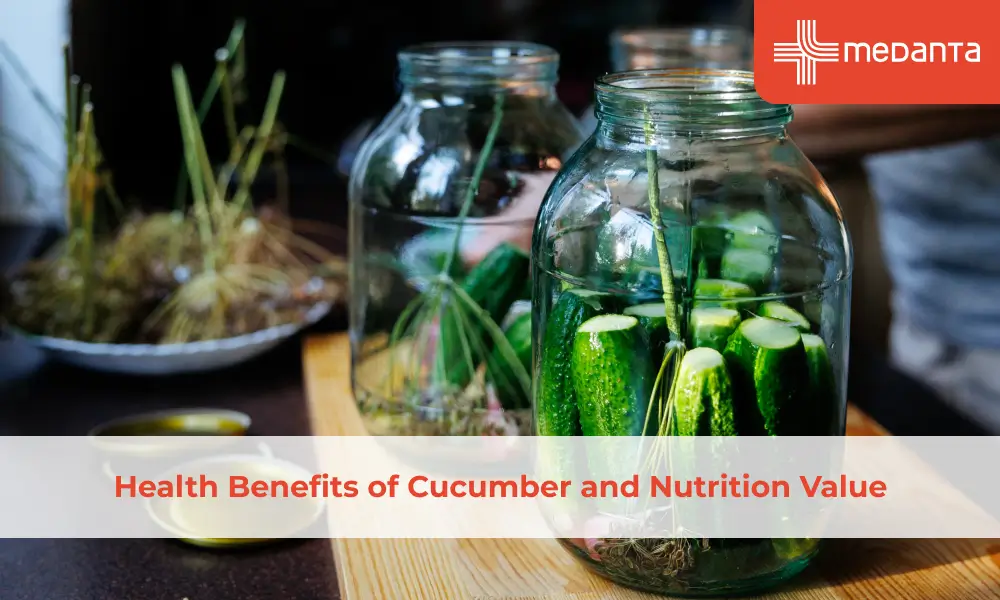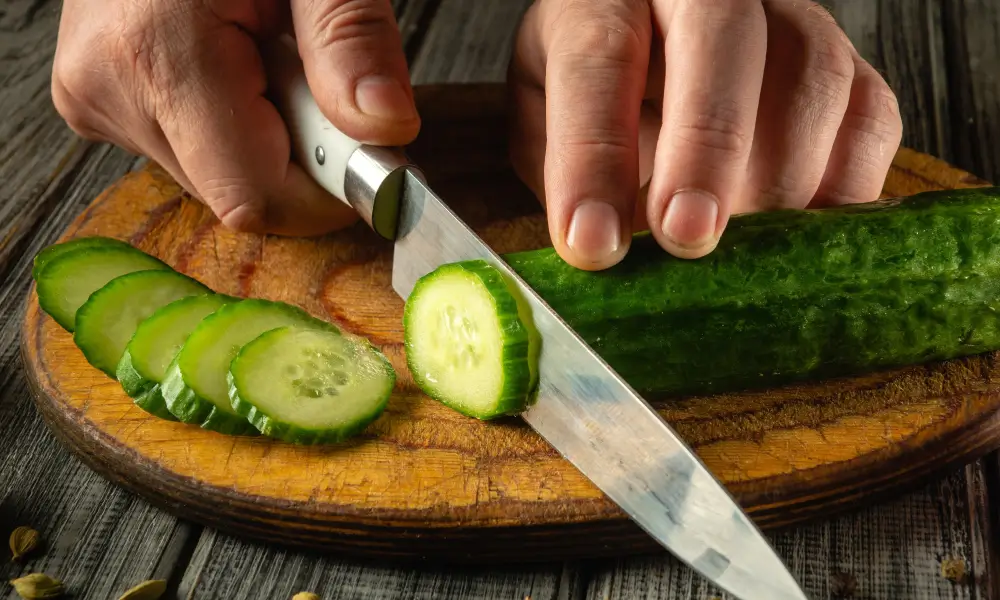Health Benefits of Cucumber and Nutrition Value

TABLE OF CONTENTS
- Nutritional Value of Cucumber
- Health Benefits of Eating Cucumber
- Cucumber Seeds Benefits for Health
- Uses of Cucumber in Food and Natural Remedies
- Best Time to Eat a Cucumber for Maximum Benefits
- Kheera Benefits in the Indian Diet and Tradition
- Possible Side Effects of Overeating Cucumber
- Conclusion
- FAQs
Cucumbers are more than just refreshing. These water-rich vegetables pack impressive nutrition with very few calories. Nature has blessed us with these hydrating foods that are 96% water. These simple-looking vegetables are nutritional powerhouses. Each medium unpeeled cucumber has only 30 calories, a significant amount of fibre and provides vitamins A, K, and C, plus minerals like potassium and calcium. These nutrients help keep your digestion healthy. The health benefits of cucumber go beyond hydration, supporting overall wellness and aiding in weight management, skin health, and digestion.
Here's something you might not know – cucumbers are actually fruits, not vegetables, though we usually eat them in savoury dishes. This green fruit is a mix of fresh taste, water content, and nutrients making it a true everyday superfood. Let's take a closer look at how cucumbers can boost your health.
Nutritional Value of Cucumber
A medium-sized unpeeled cucumber (200g) has:
Water 96%
Calories 30 cals
Carbohydrate 7.3g
Fat 0.2g
Fibre 1g
Protein 1g
Calcium 32mg
Iron 0.6mg
Potassium 295.5mg
Health Benefits of Eating Cucumber
Cucumber's high water content works with potassium to keep blood pressure levels healthy. A study of elderly participants with hypertension showed their blood pressure dropped after they drank cucumber juice for just 12 days.
Cucumbers have unique plant compounds called cucurbitacins and lignans that bring amazing health benefits. These compounds help you:
Reduce inflammation in the body
Fight cancer cells, especially in breast cancer
Improve digestion and prevent constipation
Cucumbers score low on the glycemic index, so they give you nutrients without raising blood glucose. The fibre content helps control hunger by keeping you full longer.

Cucumber Seeds Benefits for Health
These tiny seeds are a nutritional powerhouse! Cucumber seeds have plant sterols that help lower LDL (bad) cholesterol. They are packed with essential vitamins like C, K and B1, among minerals like magnesium, potassium, and zinc.
The seeds give you dietary fibre that helps digestion and keeps bowel movements regular. Research shows that cucumber seeds can support bone health and prevent conditions like osteoporosis.
Uses of Cucumber in Food and Natural Remedies
This versatile vegetable adds both flavour & health benefits to your meals. People use cucumber as a cooling ingredient in many dishes & remedies worldwide.
Including cucumber in your diet:
Salads: Mix cucumber with tomatoes, onions and herbs to make refreshing side dishes like kachumber or Greek salad.
Smoothies: Blend cucumber with fruits, yoghurt and mint to create a hydrating drink that clears toxins.
Sandwiches: Layer thin cucumber slices with cream cheese on bread for a classic refreshment.
Raita: You can mix cucumber with yoghurt, herbs & spices to relish an Indian side dish.
Pickles: Preserve cucumbers in vinegar, salt, and spices to create long-lasting pickles.
Curry: Cook yellow cucumber with onions, tomatoes, and spices to prepare a traditional South Indian dish.
Best Time to Eat a Cucumber for Maximum Benefits
High water and fibre in cucumber to create a feeling of fullness when eaten before meals. The metabolism in your body gets a boost when you eat a cucumber in the morning. You should eat a cucumber at least 30 minutes before meals to digest it better.
Kheera Benefits in the Indian Diet and Tradition
Indian cuisine features cucumber (kheera) in many traditional dishes.
Raita a cooling side dish that supports digestive health, combines cucumber with yoghurt.
Ayurvedic practitioners give you drinks with cucumber, lemon & mint to remove impurities.
Cucumber's healing properties work well in treatments (paste with turmeric for skin irritations & mixing it with yoghurt soothes sunburns.
Possible Side Effects of Overeating Cucumber
Cucumbers provide many health benefits, but eating too many can cause unexpected problems.
Most people can digest cucumbers without issues, but overconsumption might trigger several health concerns. It gets its bitter taste from compounds called cucurbitacins. It can become toxic if consumed in large amounts and cause stomach pain, nausea & vomiting.
Cucumbers' water content can backfire and lead to dehydration if you have too many of them, as it is a mild diuretic causing increased urination thus disrupting electrolyte balance in the body.
Your digestive system might react against too many cucumbers. People often report bloating, gas & stomach discomfort. The cucumber's potassium content helps your health in moderate amounts but could trigger a rare condition called hyperkalemia with excessive intake. This condition can harm your kidneys and cause stomach cramps.
Allergic reactions can occur if you have sensitivity to ragweed pollen, melons, bananas or latex. The symptoms can range from mild itching to severe breathing problems that need immediate medical help.
Blood-thinning medication users should avoid sudden increases in cucumber consumption. This also holds true for people with diabetes who must keep an eye on what they eat. Cucumbers can bring down blood sugar levels, which might interfere with their medicines.
Conclusion
Cucumbers provide many health benefits, but eating too many can cause unexpected problems. Most people can digest cucumbers without issues, but overconsumption might trigger several health concerns. It gets its bitter taste from compounds called cucurbitacins. It becomes toxic in large amounts and causes stomach pain, nausea & vomiting.
Cucumbers' water content can backfire and lead to dehydration if you eat too many as it is a mild diuretic. It can increase urination thus causing an electrolyte imbalance in your body. Your digestive system might react against too many cucumbers developing bloating, gas and discomfort in your stomach. Therefore consume them in moderation and enjoy their health benefits.
FAQs
What are the main health benefits of cucumbers?
We discovered that cucumbers boost hydration since they're 96% water. These versatile fruits lower blood sugar levels, prevent constipation, and help manage weight. Their antioxidants protect against harmful free radicals. Each cucumber packs 442mg of potassium that helps maintain healthy blood pressure. The vitamin K content makes bones stronger and reduces fracture risk.
Is it good to eat a cucumber every day?
Yes! Most people can safely eat cucumbers daily. At just 45 calories per 300g, they are perfect to munch on regularly. Your body gets steady hydration, nutrients, and digestive benefits. But remember to keep portions moderate to avoid stomach issues.
What are the benefits of cucumber seeds?
These tiny powerhouses are rich in vitamins K, C, and magnesium. The fibre in cucumber seeds supports healthy digestion and prevents constipation. Their potassium and magnesium work together to maintain healthy blood pressure. Plant sterols in the seeds also help lower LDL cholesterol.
How does a cucumber help in weight loss and hydration?
A cup of cucumber has only 16 calories. The high water and fibre content keep you feeling full longer, which naturally reduces calorie intake. Since they are 96% water, cucumbers help cells stay hydrated and fight dehydration. This makes them a smart choice for weight management.
What are the traditional kheera benefits in Indian diets?
Indian Ayurveda shows that cucumber (kheera) works best in hot weather and helps the body adapt to extreme heat. People use it as a natural coolant during summer. Traditional medicine values cucumber's ability to purify blood and clear skin problems like acne and rashes. The fruit also supports urinary health.
Can a cucumber improve skin and hair health?
Absolutely! The vitamin C and caffeic acid in cucumbers reduce inflammation and refresh skin. Your skin stays hydrated thanks to its high water content. Hair benefits from cucumber's silica and sulphur that boost growth and reduce hair loss. These minerals make hair stronger, shinier, and less likely to thin out.
What happens if you eat too much cucumber?
Too many cucumbers might lead to hyperkalemia from excess potassium. The bitter-tasting cucurbitacins can upset your stomach and cause nausea or vomiting. While cucumbers hydrate, eating too many might actually dehydrate you by increasing urination. Some people might experience bloating, gas, or allergic reactions.






